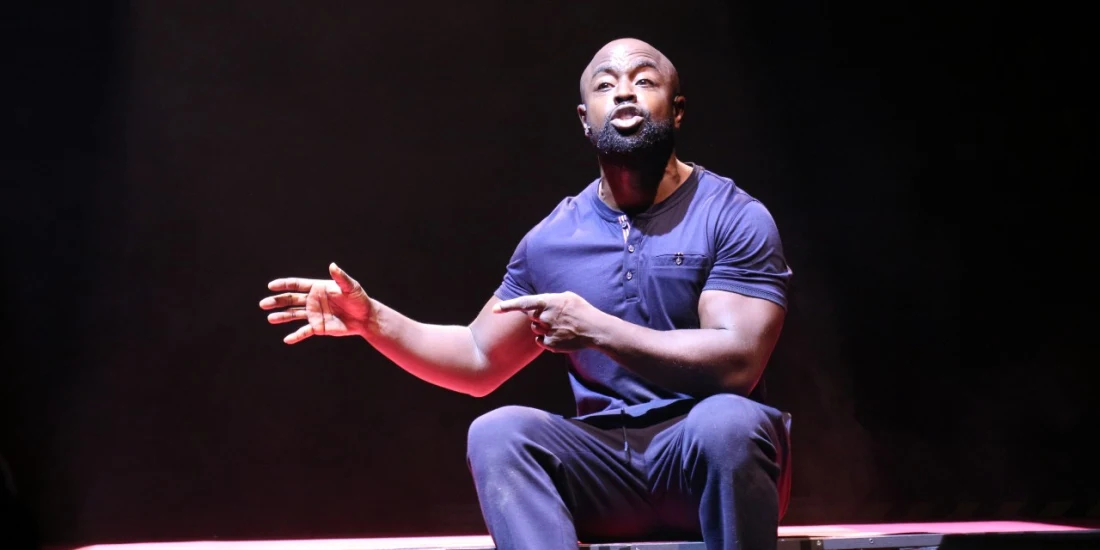'Death of England: Delroy' delivers an 'explosive exploration of Black British identity'
"Keep your social racial distance please" intones a robotic announcement repeatedly in the opening moments of this electrifying new monologue by Roy Williams and Clint Dyer. This is not a play about the pandemic, but it is thrillingly plugged in to our current extraordinary moment, with all its division, anger, and fear, all its ripping away of certainties and its fragile hope for the future. Opening night was also closing night, thanks to lockdown. For those who were there, it was unforgettable.
Delroy is a companion piece to Williams and Dyer's earlier collaboration, Death of England. In that play, Rafe Spall as white Essex lad Michael rampaged through rage and grief over the death of his racist dad. Now Delroy, Michael's best mate from childhood who's also the boyfriend of his sister Carly, delivers an explosive exploration of Black British identity and belonging. The writing is laceratingly funny, painfully honest, scaldingly furious. And in Dyer's riveting production, Michael Balogun gives a dynamic, rapid-fire performance, pummelling the audience in the cavernous Olivier auditorium with wit and passion.
On Ultz and Sadeysa Greenaway-Bailey's cruciform walkway set - its shape echoing the St George's Cross of the England flag - Delroy ricochets between two women: Carly, represented by a blingy statue of Britannia; and his Jamaican-born mother, whose onstage emblem is a bust of Nefertiti. His mum never approved of Delroy's choice of girlfriend; but Delroy and Carly got pregnant. When he gets the call to say Carly's giving birth, Delroy - working as a bailiff - is out on his rounds cheerfully spreading economic misery: "Someone has to pay for me to live rich - that's the British way." He tries to race to the hospital - only to get stopped by police, arrested and detained.
Swigging on a can of Guinness, Delroy pours out a molten torrent of emotion and imagery. The cop kneeling before him to fix a tag on his ankle, which he wryly recounts as an inversion of U.S. footballer Colin Kaepernick's famous act of protest; white couples at ante-natal classes taking him for Carly's Uber driver; his shame, frustration, and despair when, locked in a police cell, he's crushed by injustice and stricken with dread that he's failed at fatherhood before he's even begun; and his heart-bursting determination to fight for his family, as he straps on a baby sling as if it were body armour.
A soundtrack of Benjamin Clementine and FKA Twigs mingles with courtroom gavel blows that morph into gunfire, and the pounding ultrasound heartbeat of his child. CCTV cameras rise through the floor, his every move under surveillance. The references to Black Lives Matter marches and the murder of George Floyd may feel slightly over-deliberate, but the play perceptively points up how knotty and tangled the connections can be between the personal and the political. Delroy is a Boris and Brexit-voter ("Island mentality innit? Why should I care? No one cares about me"). He admits, though, that his motives are complex and confused: maybe it's about money and self-preservation - but maybe it's a kind of revenge, and maybe our inequality-riven, blinkered nation deserves everything it gets. He loves Carly, yet even their relationship is tainted by her casual racism: "It's a bit Stockholm syndrome, but what can I say?"
Similarly, he loves Britain, his birthplace, his home - but when, the play asks, will it truly love him back? This is vital, urgent theatre, unflinchingly confronting our present, and setting its sights on the future.
Delroy will be streamed online later this year
Originally published on
